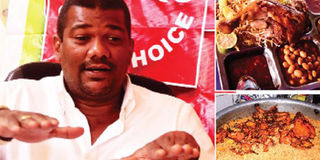Uhuru: Start small but dream big

Salim explains that they needed to reach out to people because many of them could not come to Kisenyi to enjoy the food. Photos by Edgar R. Batte
What you need to know:
Uhuru Restaurant was opened by Salim’s father, Abed Saad. Today it is one of the places popular for making tasty pilao, and more recently biryani rice, writes Edgar R. Batte
Uhuru is one of Uganda’s oldest family restaurants. Like its Swahili name alludes, it started in 1962 and the current director, Salim Saad Uhuru, explains, it was one of the last establishments governor Sir Andrew Cohen launched.
How he started
To appreciate the business story of the eatery, one would naturally have to go back a couple of years, at a time when Salim was only 12 years old. His father taught him how to cook, and at the time, the youngster was not really keen. He was only in Primary Seven but already, his father was planning for the continuity and sustenance of the business.
“My father made sure I learnt how to cook. The part I hated most about cooking was cutting onions which made my eyes teary,” he recalls.
No regrets
Looking back, there are no regrets because he owes his success and fame to cooking and serving meals.
The original Uhuru family restaurant was located in Kisenyi where Saad raised the family and thus established a business.
In 1998, Salim went solo, and flew with the family name. He was friends with rally driver Chipper Adams, who implored him to start serving food at motorsport events.
Salim liked the idea and went on to pursue the business idea.
Breakthrough
“Serving food to motorsport fans earned me my first million. I went to make money at other motor sport events, for example the ‘Triple five Marlboro’. I offered a good option to fans who were used to eating pork and mangoes,” he adds.
Motorsport which was hosted in Maya, along Masaka Road at the time, attracted a big following.
Salim would prepare pilao and transport it hot in saucepans and serve it to the sport’s fans.
While starting the outside catering arm of the business, Salim could use more hands to get food to people to deliver food door-to-door. He linked with Abdu Mugenyi and Charles Kasaija who would transport the food on bicycles in translucent polythene bags to customers in different parts of Kampala and its suburbs.
Mugenyi lived in Kisenyi and had seen Salim grow up while Kasaija had just arrived in Kampala from Fort Portal, on a truck ferrying matooke. The duo still work at the restaurant, still in the catering section as transporters.

Uhuru says that he is keen on relating with people who appreciate their history and background and dully work to better themselves.
Expands
Salim explains that they needed to reach out to people because most of them could not come to Kisenyi to enjoy the food.
The mention of Kisenyi attracted chills since it was associated with criminals, drug abusers and the like.
In order to make business sense, he resorted to vending the food in order to reach more clients than those he catered to in Kisenyi.
And in a market where different people advertise themselves as pilao makers, Uhuru’s director disputes their claim, saying many restaurants sell brown rice as pilao.
“There are different ways people prepare their pilao. I have heard of people who add tea leaves to the rice to make it brown it. Pilao is a special meal with special preparation formula. That is why it used to be a dish for special days such as Eid and Christmas. Not any rice will make you pilao. Basmati rice is recommended and then a keen process in preparation,” Uhuru argues.
He adds that on top of the cooking knowledge he acquired from his father, he has added creativity to achieve the taste of the rice meal. Not that he cooks all the pilao served to customers.
What makes him tick?
He has empowered his human resource (HR) enough, to take decisions even in his absentia. Many of the employees at the business have worked at the restaurant for two decades or slightly less.
When choosing the people, he works with, Uhuru says he is keen on relating with people who appreciate their history and background and dully work to better themselves.
Finance is a delicate part of business and a determinant of its lifetime. He chose to be a sole proprietor because he is unsure how decision making plays out.
For example, there are days he forfeits profits of one day in order to grow a section of business which could turn into a challenge if more people are involved in decision making.
“It is important to reinvest in a business in order to remain competitive in terms of branding and general dynamics,” he observes. His business advice is anyone planning to do business or already engaging in it, should know what they want to do and invest time to research about it.
“Avoid acquiring a loan when starting out because you are not yet sure about the lifeline of a business. You can start small and still think big. Look at some of the success people we look up to today. They started small and have grown big over time. I would like to achieve a legacy of acquiring a commercial building in town so that I can outlive renting space which is so expensive,” Salim further explains.
He is a compliant businessman. He pays Value Added Tax (VAT) of Shs1m, income tax of Shs2m, withholding tax depending on a job he’s asked to offer catering service for, water bills of between Shs800,000 and Shs1m, electricity bills oscillating between Shs1.5m and Shs2m.
After paying the bills, he will pay himself a salary of between Shs3m and Shs5m depending on the business climate and how well the business is performing.




